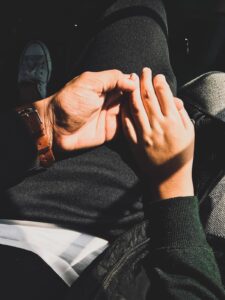EMOTIONS AND ORGANS
How They Relate

Have you ever had your heart broken and wondered why you felt actual physical pain? We’ve all experienced it and it happens for a variety of reasons. The most common reason is the loss of relationship, but heartbreak can also be present after the loss of a job, the loss of a pet, a traumatic experience, or even at the onset of depression. You may feel tightness in your chest followed by shortness of breath and dizziness that doesn’t make sense because it’s just your emotions, right? Wrong. There’s actually a connection between your emotions and your organs. What happens in the emotional body directly affects the physical body.
According to the Traditional Chinese Medicine, the five major organ systems involve pairs of organs and an associated emotion. The Liver and Gallbladder are associated with anger, the Heart and Small intestine are associated with joy, the Spleen and Stomach are associated with over-thinking or pensiveness, the Lungs and Large intestine are associated with grief, and the Kidney and Bladder are associated with fear.
The Heart and Love
 Interestingly enough, sometimes our organs may even change shape when exposed to extreme stress.Take your Heart for example. It’s responsible for pumping blood throughout our bodies. It’s also romanticized and most often associated with the emotion of love. We say things like, “my heart is telling me that I love you” or “I feel it in my heart,” etc. How many times have you cried while listening to love songs that reference the Heart and the loss of romantic love? So. Many. Times. Considering that we’ve all experienced the pain that comes from a broken heart, it shouldn’t be too surprising that there’s a physical change that’s happening as well.
Interestingly enough, sometimes our organs may even change shape when exposed to extreme stress.Take your Heart for example. It’s responsible for pumping blood throughout our bodies. It’s also romanticized and most often associated with the emotion of love. We say things like, “my heart is telling me that I love you” or “I feel it in my heart,” etc. How many times have you cried while listening to love songs that reference the Heart and the loss of romantic love? So. Many. Times. Considering that we’ve all experienced the pain that comes from a broken heart, it shouldn’t be too surprising that there’s a physical change that’s happening as well.
When this change occurs, the Heart can change to resemble something like a takotsubo,(a Japanese pot with a wide base and a narrow neck that’s used to capture octopus). This is a condition called Takotsubo Cardiomyopathy. It’s when there’s a temporary weakening of the muscular portion of the Heart due to emotional stress and causes it to balloon into the distinctive shape of a takotsubo. The syndrome usually resolves within a few weeks, however, in extreme cases it can cause heart failure, arrhythmias and even death.
Coping with the emotional and physical changes that happen in the Heart can be challenging, especially if you aren’t in control of your thoughts. Emotions attached to certain beliefs are actually the most powerful. There was a phenomenon written about in 1942 called Voodoo Death where people were reportedly dying from what they thought was “black magic.” They believed they were cursed and lived in such a state of fear that they ultimately died from heart failure. That should go to show you just how strong the connection is between our emotions and our organs.
Happiness and love are often a representation of the Heart being in a state of peacefulness. Living in a peaceful state is the goal, wouldn’t you say? So, focus on maintaining a state of peace through regular meditation practice and give your Heart a chance to recover after managing all the stressors life throws at you.
The Liver and Anger
 The Liver is another organ that has a direct connection to your emotions. It takes the brunt of the stress from anger and can manifest itself as headaches, dizziness and blurred vision. A lot of times, holding things in and not expressing how you feel can be the culprit of these nasty side effects. The best way to cope is to express your anger in a healthy way so you can begin to understand it. These physical manifestations are actually an indicator that something is off balance with your Liver Qi. You can give yourself an acupressure massage to help alleviate the energy blockage. Rub the point called “Taichong” (Liver 3). The webbing on top of your foot that is in between your first two toes. If it’s sore, then it means you’re hitting the right spots!
The Liver is another organ that has a direct connection to your emotions. It takes the brunt of the stress from anger and can manifest itself as headaches, dizziness and blurred vision. A lot of times, holding things in and not expressing how you feel can be the culprit of these nasty side effects. The best way to cope is to express your anger in a healthy way so you can begin to understand it. These physical manifestations are actually an indicator that something is off balance with your Liver Qi. You can give yourself an acupressure massage to help alleviate the energy blockage. Rub the point called “Taichong” (Liver 3). The webbing on top of your foot that is in between your first two toes. If it’s sore, then it means you’re hitting the right spots!
The Kidneys and Fear
The emotion that corresponds to the Kidneys is fear. The Kidneys serve as the reserve generator for the energy that your body needs to function. When you experience fear, you may feel an energy drop that is very descending in nature. If the adrenals are weak, your body starts cooling and and you can suddenly start to feel exhausted. You can support your Kidney’s energy a few different ways. First, slowly stomp your feet for about 5 minutes a day. The Kidney meridians run through the heel and the sole of the foot, so this will help to stimulate your Kidney’s energy. You can also rub your ears for a few minutes a day. The ears are energetically connected to the Kidneys. You can also listen to your body when you’re feeling tired and stop to rest. Give yourself permission to take breaks and de-stress.
The Lungs and Grief

Grief is the emotion that is associated with the Lungs. It can weaken the nervous system and drain you of your energy. If you are having trouble processing grief, you may have a block in your Lung energy. In Chinese medicine, the Lungs are responsible for helping you “let go” of that which you no longer need. If your Lung energy needs a boost, do some spring cleaning! Throw out items that no longer bring you joy. Whether it’s old clothing, old furniture or even old thought processes that you just need to let go of, clearing out space will make a world of difference for your energy.
The Stomach, Spleen, and Stress
The Stomach and Spleen are directly tied to chronic stress, worry, and anxiety. Your Stomach has the herculean task of digesting not only your food, but your emotions as well. If these organs aren’t functioning properly, you may experience poor digestive health and low metabolism function. The good news is that there are some great ways to keep your Stomach healthy. Try to focus on staying positive and clearing negative, worrisome thoughts. The less negative energy your Stomach has to process, the better. You can also do your tummy a solid favor and finish eating your meals by 6 or 7 pm so it has a chance to rest when you go to bed.
Isn’t it fascinating that our emotions and organs are so intertwined? It gives new meaning to the phrase “mind-body connection” and it can help to give us insight on ways to best care for our overall wellness.
Newer
What You Need to Know about Tai Chi and Qigong
Older
Medicinal Hickies? Get the Scoop on Cupping
Comments (0)
Leave a reply
You must be logged in to post a comment.




